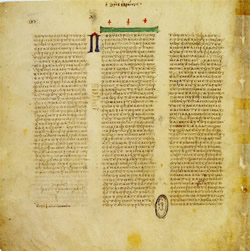The Only, Entire, and Greatest Thing:
The Most Important Verse Not in the Bible
For Sunday July 1, 2007
Lectionary Readings (Revised Common Lectionary, Year C)
2 Kings 2:1–2, 6 –14 or 1 Kings 19:15–16, 19–21
Psalm 77:1–2, 11–20 or Psalm 16
Galatians 5:1, 13–25
Luke 9:51–62
 |
Galatians 5:20–6:8 in Papyrus 46, c. 200AD. |
If your Bible has study notes, you'll see that some ancient manuscripts insert an extra verse in this week's Gospel at Luke 9:56. I think of this extra verse as the most important verse not in the Bible. At Luke 9:56 some Greek manuscripts add a conclusion to the story: "And Jesus said to them, 'You do not know what kind of spirit you are of, for the Son of Man did not come to destroy men's lives, but to save them.'"
As Jesus traveled to Jerusalem he sent his advance team to a Samaritan village to prepare for his arrival. "But the people there did not welcome him," writes Luke. Because they rejected Jesus, or maybe because of the Samaritan's ethnic hostility toward them, the disciples James and John exploded in rage: "Lord, do you want us to call down fire from heaven to destroy them?!" They probably spoke figuratively, not literally, but that's small consolation given their desire for revenge. Instead of rebuking the Samaritans who rejected him, Jesus rebuked James and John who defended him. Then comes the extra verse that shouldn't be in the Bible: "And Jesus said to them, 'You do not know what kind of spirit you are of, for the Son of Man did not come to destroy men's lives, but to save them.'"
 |
4th century Codex Vaticanus B, the entire text of OT and NT. |
As of 2003, we had 5,735 ancient manuscripts of the New Testament, some of them bits and pieces of papyrus, some of them complete books. No other ancient text, Homer or Aristotle for example, enjoys anything remotely close to this avalanche of manuscript attestation. When textual scholars—God bless them!—compare, contrast and cross-check every last one of these 5,735 fragments of evidence, they reach an overwhelming consensus: even though we don't have the original documents that Luke, for example, wrote, and even though there are many differences among those 5,735 manuscripts, the Bible that we read today is a mirror image of the texts as they were originally written. In effect, we read "the real McCoy" and not some corrupt approximation.
Unfortunately for me, this unprecedented textual precision leads the experts to reject my favorite addition to the Bible. In the footnote at the bottom of my Greek New Testament the editors assign this variant reading a grade of "C." That's no better than how you'd feel about getting a "C" on a test; it means that there's significant doubt that the verse added at Luke 9:56 belongs in Luke's original. Rats.
But I'm not so ready to give up. I'm actually glad that a later copyist inserted his gloss. It's like a one-sentence commentary of what he considered the gist of the Gospel story to be: "Jesus didn't come to destroy men's lives, but to save them." Even though the addition doesn't convey the original words of Luke, it surely communicates the authentic spirit of Jesus.
 |
4th century Codex Sinaiticus, the entire text of OT and NT. |
We don't know if Jesus spoke those words, but they clearly express the broader Jesus tradition about which there's no debate. They sound like something he would say and have the ring of truth. The authentic Luke 19:10 sounds suspiciously similar to the non-verse (which is one reason why textual critics reject it as spurious): "The Son of Man came to seek and to save what was lost." So does John 3:17: "God did not send his son into the world to condemn the world." There's even a similar and spurious textual variant at Matthew 18:11: "The Son of Man came to save what was lost." So, the interpolation might not be authentic, but its sentiment is.
When James and John invoked divine wrath on the Samaritans, they betrayed an attitude diametrically opposed to everything Jesus said and did. A few verses earlier John tried to stop an exorcist from healing a person because "he was not one of us" (Luke 9:49). These zealous disciples transformed the good news of God's unconditional and limitless love for all people into the bad news that God had it in for them. The "good news" belonged to them, the "bad news" was for others. Similarly, for many people today religion is what Christopher Hitchens calls a "force multiplier of tribal suspicions and hatred," and God is an angry tyrant before whom people must grovel in fear.
But not for Jesus. As pastor Rob Bell of Michigan wrote in his book Velvet Elvis, the story of Jesus is good news for everyone, not just for believers, and it's good news especially for those who don't believe it. Every person without exception can say with the Psalmist, "this I know, that God is for me" (Psalm 56:9).
 |
Epistle of St. James 2:16–18, 22, 24–25; 3:2–4, 5th century. |
Paul emphasizes divine favor expressed through human love in this week's epistle. "The only thing that matters," wrote Paul, "is faith expressing itself in love." You can summarize the entire Bible, he insisted, in five words: "Love your neighbor as yourself." This is nearly a verbatim quote from Jesus himself (Matthew 22:37f), who had quoted it from the more ancient Leviticus 19:18. To the Corinthians he wrote that the "greatest gift" is love, without which we are nothing but an irritation and a nuisance. And writing to the Romans, Paul urged the believers not to owe anyone anything, "except the continuing debt to love one another, for he who loves his neighbor has fulfilled the law" (Galatians 5:6, 14; Romans 13:8).
Demonstrating divine favor to every person, rather than denying it to any person, validates any claim about the love of God. For both Jesus and Paul divine love made human was the only thing, the entire thing, and the greatest thing. The additional verse added to the text of Luke 9:56 is clearly spurious, but the authentic voice behind its tradition is unmistakably original: "the Son of Man did not come to destroy men's lives, but to save them."
For further reflection:
* In what ways do Christians today "call down fire" on other people like James and John?
* Why do you think we do this?
* Cf. John: "If anyone says, 'I love God,' yet hates his brother, he is a liar. For anyone who does not love his brother, whom he has seen, cannot love God, whom he has not seen. And he has given us this command: Whoever loves God must also love his brother" (1 John 4:20–21).
* Cf. Tertullian (AD 155–220): "Our care for the derelict and our active love have become our distinctive sign before the enemy . . . See, they say, how they love one another and how ready they are to die for each other."
* Cf. Saint Maximos the Confessor (580–662): "Blessed is the one who can love all people equally . . . always thinking good of everyone."
* See Bruce Metzger and Bart D. Ehrman, The Text of the New Testament: Its Transmission, Corruption, and Restoration. 4th ed. Oxford University Press, 2005; and Arthur Patzia, The Making of the New Testament; Origin, Collection, Text and Canon (IVP, 1995).





